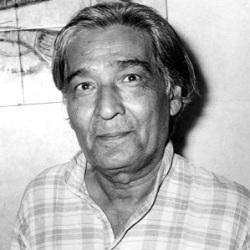 Jan Nisar Akhtar
Jan Nisar Akhtar
(Jān̲ Nis̲ār Ak̲h̲tar)
1896-1982
 Jan Nisar Akhtar
Jan Nisar AkhtarJan Nisar Akhtar (Jān̲ Nis̲ār Ak̲h̲tar; 1914-76) was born in Gwalior, in today’s Madhya Pradesh, into a family of Sunni theologians and poets. His father was the poet Muztar Khairabadi (1875-1927), and his great grandfather, Maulana Fazl-i Haq Khairabadi (1797-1861), was a poet as well as a theologian who served as the editor of the collected poems of Mirza Ghalib, at the poet’s request. Akhtar studied at Aligarh Muslim University, receiving his B.A. in Urdu in 1937 and M.A. in 1940. He then taught for several years, during which time he became associated with the Progressive Movement. He resigned from teaching in 1946 and went to Bombay/Mumbai, where he became a successful film lyricist, working with various Progressive writers such as Sahir Ludhianvi (1921-80), Ismat Chughtai (1915-91), Krishan Chander (1914-77), and Rajinder Singh Bedi (1915-84).
He published his first collections of poems, Silāsil (Chains), in 1942. As a Progressive poet, he wrote works with appropriate leftist political and humanitarian themes, such as political freedom, independence, disappointment with independence, and praise of the Soviet Union, as found in his paean to Russia, “Rūs ko salām” (Hail, Russia)* and “Fareb-i bahār” (Illusion of Spring).* Yet in his ghazals especially, he speaks of romance, love, the beloved, and family life as in poems such as “۲۵ disambar (25 December),* which celebrates his wedding day, and one of his most famous poems, “Khāk-i dil” (Ashes of the Heart),* a poignantly moving elegy on the death of his wife, Safiya. The collection Khāk-i dil (1973) contains works written between 1935 and 1970; for it he received the 1976 Urdu Sahitya Akademi Award.
His family’s long tradition of poets continues with his two sons: the highly successful film lyricist and poet, Javed Akhtar (b. 1945), and the prominent Indian-American psychoanalyst, Salman Akhtar (b. 1946), who writes poetry in Urdu and English. See Safiya Akhtar, “Letters to Jan Nisar Akhtar,” Annual of Urdu Studies, 20 (2005) 242-54; and Carlo Coppola, “Meeting Krishan Chander & Salma Siddiqi, Then Dinner and Bar-Hopping with Sahir Ludhianvi, Rajinder Singh Bedi & Jan Nisar Akhtar,” Speaking of/with/to/& about South Asian Writers: Interviews and Essays (forthcoming).
2. Fareb-i bahār / Illusion of Spring
3. K̲h̲āk-i dil / Ashes of the Heart
5. Rubāʻī; Titilī koī betarah bhaṭak kar / Quatrain: Some butterfly is wandering madly
6. Rubāʻī; Yun us ke hasīn ‘ārizon par / Quatrain: On her rosy cheeks
These poems have been translated from: Jāvidān̲ (Forever). Bambaʼī: Idārah-yi Adab va Zindagī. n.d. (c. 1955).
Further Reading
Akhtar, Sufiya. “Letters to Jan Nisar Akhtar.” Annual of Urdu Studies. 20. 2005. 142-54. Trans. Mehr Afshan Farooqi.
Coppola, Carlo. “Meeting Krishan Chander, Then Dinner and Bar-Hopping with Sahir Ludhianvi, Rajinder Singh Bedi and Jan Nisar Akhtar.” Speaking of/with/about/to South Asian Writers: Interviews and Essays. Bombay; Monday, 29 January 1968. 6:15 p.m. Forthcoming.
Datta, Amaresh. “Jan Nisar Akhtar Biography.” The Encyclopaedia of Indian Literature Vol. 2. New Delhi: Sahitya Akademi. 1796-97.

